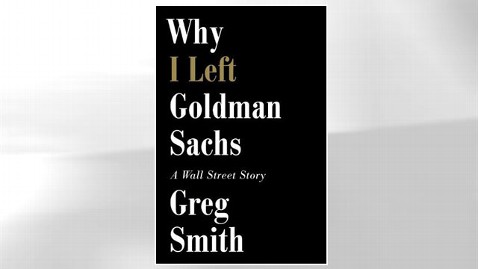Goldman Sachs Tell-All Leaked

Greg Smith, the former Goldman Sachs vice president made famous for his scathing op-ed/resignation letter in the New York Times , is in the news again-this time for his 276-page book, " Why I Left Goldman Sachs: A Wall Street Stor y", scheduled to be released Oct. 22. In the book, for which he reportedly received a near $1.5 million dollar advance, he expands on his theme that the storied firm is stuffed with monumental egos out solely for themselves.
"I am sad to say that I look around today and see virtually no trace of the culture that made me love working for this firm for many years," Smith, a 33-year old South African who worked at Goldman for 12 years, wrote in the Times. "I no longer have the pride, or the belief… I attend derivatives sales meetings where not one single minute is spent asking questions about how we can help clients. It's purely about how we can make the most possible money off of them."
In an extra dig at the company, the first chapter, titled "I Don't Know but I'll Find Out" was leaked on iTunes shortly before Goldman's third-quarter earnings report. And if the original piece-which noted Goldman's alleged "toxic and destructive" culture, described a decadent Las Vegas trip with colleagues and garnered more than three million online views within 24 hours - is any indication of what else is coming, Goldman is not going to be happy.
According to The New York Times , the book begins on Mr. Smith's first day at Goldman, where he was one of 75 interns in the sales and trading program. Twice a week he had to attend 'Open Meeting,' a kind of boot camp for trainees that began at 6 a.m. If too many people were late, the entire class would be forced to attend a makeup session at 5 a.m. the following morning.
Smith writes that he, and other interns, were often asked to get lunch for trading desks-the theory being that if an intern flubs a lunch order, he will mess up other work, too. Smith recalls one Goldman executive who asked an intern for a Cheddar cheese sandwich. The intern came back with a Cheddar cheese salad. The enraged executive tossed the salad in the trash.
In a statement, Goldman spokesperson Andrew Williams said that the company takes "any issues raised by our employees seriously. In this case, we conducted a detailed review of Mr. Smith's claims, found no evidence to support them, and found nothing to suggest that he raised these issues before he was already heading out the door."
CEO Lloyd Blankfein told CNBC that he was "not really concerned about the revelations." But he admitted that he was not "not looking forward to the hoopla."
According to Bloomberg Businessweek , Goldman hired forensic specialists to scour e- mails and taped conversations with Smith. The firm also conducted interviews with 125 employees who had contact with him, going as far back as his summer internship in 2000, a year before he became a full-time analyst in the equities division in New York. Two years later he was promoted to associate, and two years after that he became vice president. He transferred to London in 2011 to take a job supporting the desk that sells U.S. equity derivatives to European clients.
By 2012, Businessweek reports, Smith was the lowest-paid among the VPs who had started at the company with him. They also suggest that his future at the company was limited, and that managers had "discussed the possibility of Greg's departure from the firm."
The documents paint a picture "at odds with the image he fashioned for himself in the op-ed: an altruistic kid from Johannesburg, out of place in the rapacious, wealth-obsessed world of American high finance," says Businessweek. "Only Smith knows if his public denunciation of the firm was motivated by loathing for what it had become, or instead resentment upon realizing that his career was stuck and a promotion unlikely."
Smith's agent, Paul Fedorko at N. S. Bienstock, was unavailable for comment.
But Smith himself admits that he was annoyed when he only received a $500,000 paycheck in 2006.
"By the logic of the outside world, I was being absurdly well-compensated for work whose chief benefit was to maintain the robustness of the world's capital markets. … By any measure, I should have felt exceptionally lucky and grateful," Politico reports. "But by the warped logic of Goldman Sachs and Wall Street, I was being screwed."